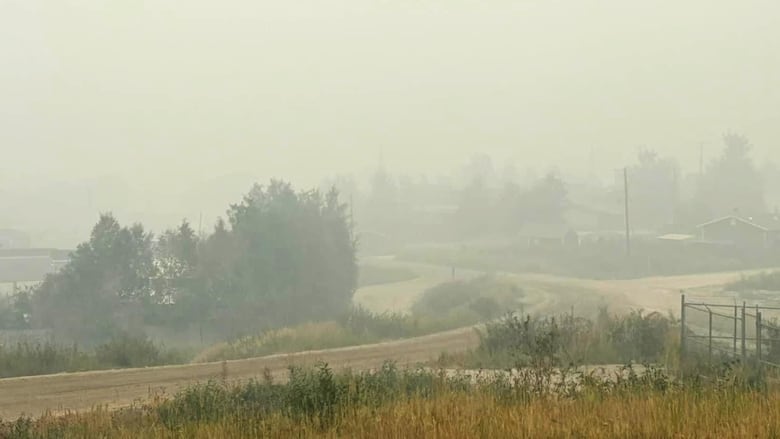Turned around: How a miscommunication sent La Loche evacuees back home
Northern Sask. village issued a mandatory evacuation Aug.1

The Saskatchewan Public Safety Agency (SPSA) is clearing the air after a recent miscommunication with community leaders led to two buses of wildfire evacuees from La Loche being turned around Sunday.
Community leaders from La Loche, which is about 515 kilometres northwest of Saskatoon, spoke out about the miscommunication on Facebook Sunday evening, saying the SPSA "refused" buses that were supposed to be transporting evacuees to Regina.
A post from community administrator Martha Morin Sunday said the SPSA had changed their policy around evacuation and heavy smoke was no longer a reason to evacuate.
Community leaders "strongly" expressed to the SPSA that a policy change should not be enacted mid-way through an evacuation, the post said.
They also said most of those being evacuated had qualified as Priority 1 and 2 residents.
La Loche's mayor also took to Facebook on Sunday evening to address the matter.
"I'll tell you guys right here that the whole council, myself and the entire council — we're all frustrated," Lyle Herman said in a Facebook live Sunday night.
Herman said he did not know why the buses had been called off, but he knew it had been done by the SPSA.
"People were loaded, we have elders, we have children that were loaded," Herman said. "To be told to get off the bus, that is unacceptable, that should have never happened."
The community advised those evacuees the buses would return to the community to pick them up and take them to Regina, according to a Sunday night Facebook post.
Many variables to consider
Steve Roberts, the agency's vice president, spoke about the incident in a Wednesday wildfire update.
"The Public Safety Agency was the support unit, and did turn and hold the buses back and ask people to debark until discussions with community leadership on whether they wish to continue," said Steve Roberts, the agency's vice president.
Roberts said an email had been sent out to community leaders talking about smoke evacuations, which led to a discussion on whether buses should be leaving the community due to smoke.
"They did wish to continue, even though, again, there was no direct fire threat," he said. "So as soon as they made their decision, we continued to support them, and we evacuated their residents."
Roberts said there are variables to consider when determining whether smoke is a threat and the SPSA does not make those decisions. Those assessments are carried out by the Ministry of Health and communicated directly to communities.
"It's not just the air quality, it's what services are available to that local community to provide respite for those folks that could be impacted," he said.
Preventive measures may also be introduced to address the smoke without having to do an evacuation.
Planning done alongside community leaders, says SPSA
Guidelines are provided in those instances, Roberts said, and may include things like limiting outdoor activities and keeping your doors and windows closed.
If a community still wishes to leave due to smoke and needs support, he says the SPSA will support them and move them out.
Roberts noted when it does come to transporting evacuees out of a community, there is a lot of planning to do.
"There will always be a delay with buses," he said. The agency has to consider what time the buses will leave, their final destination, when they will arrive and what evacuees will need along the way.
"When you consider loading people in in La Loche and putting on a bus in the middle of the night to go all the way to Regina … you know, they may need food support," Roberts said.
"They'll have to get registered and identify which of the four hotels that are on hold, which will they be getting rooms?"
Roberts said planning is done alongside community leaders and issues could arise when they decide "on who they want to be evacuated, what direction they're providing to their own residents about the evacuation."
Many questions involving where residents are being sent and for how long can only be answered by community leaders, Roberts said.
"It is a community-based decision," he said. "We work directly with local emergency operations centres in those communities, with our staff, to give them what support and information they require."
2.3 million hectares reportedly burned this year
There are currently 81 active wildfires in the province, with only six listed as contained.
"We have had scattered rain across the northern part of the province. That rain has not been significant," Roberts said.
While there is improved fire behaviour, Roberts said there has been no significant change in the overall outlook of the wildfires in Saskatchewan's north.
The province is still relying heavily on firefighting resources from Quebec, Mexico, Australia, British Columbia, Ontario and Prince Edward Island.
Roberts said there are currently 190 Type 3 local firefighters assisting and 300 Armed Forces personnel in the province for at least another week.
Roberts said 2.3 million hectares had burned in Saskatchewan as of 1:30 p.m. CST Wednesday, with many of the wildfires impeding on major highways, including Highway 955, Highway 914, Highway 916 and Highway 918.
As a result, 13 communities remain under evacuation orders and 3,000 people have been displaced.
"We have ongoing discussions with those community's leaders on fire behaviour, on the pending weather conditions and changes to those fires, access power utilities, and whether there may be opportunities for repatriation," Roberts said.

